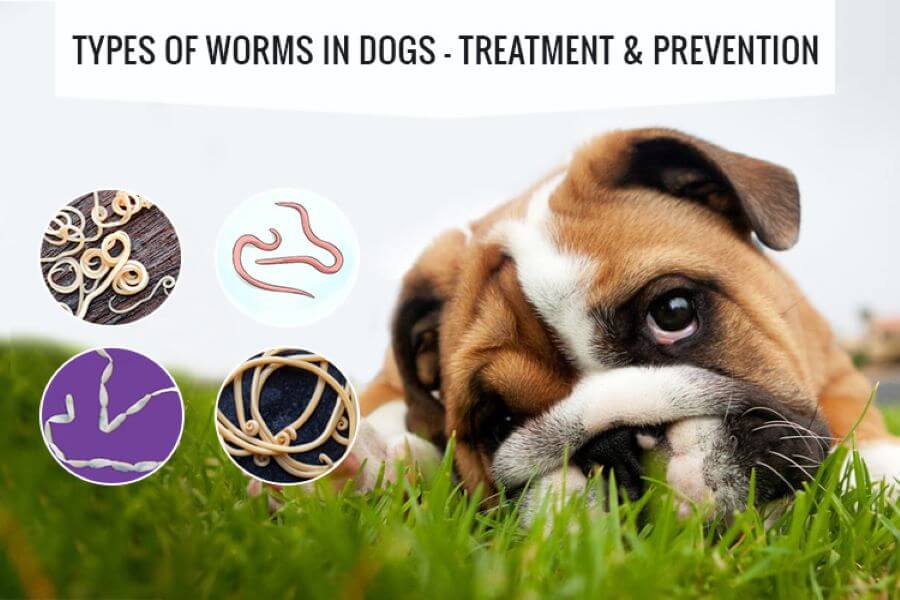
Dogs are susceptible to a variety of parasites, including worms. These parasites can cause severe health problems if they are not treated properly. While there are many different types of worms that can affect dogs, some are more common than others. In this blog, we will discuss the types of worms that can affect dogs, symptoms to look out for, diagnosis, treatment, and prevention of worms in dogs.
Introduction to Common Dogs Intestinal Parasites
Worms are internal parasites that can live in the intestines of dogs and other mammals. They can cause a variety of symptoms and health issues, including diarrhea, vomiting, weight loss, and anemia. If left untreated, worms can even be fatal. While many different types of worms can affect dogs, the most common are roundworms, hookworms, whipworms, and tapeworms.
Types of Worms That Can Affect Dogs
Roundworms are the most common type of worms found in dogs. They are large and white and look like spaghetti. Roundworms live in the small intestine, where they feed on food particles, which can lead to nutrient deficiencies in dogs. Roundworms can be passed from mother to puppy through milk, as well as through contact with contaminated soil.
Hookworms are small, thin worms that attach themselves to the walls of the small intestine. They feed on the blood of their host, which can lead to anemia and malnutrition. Hookworms can be transmitted to puppies through the mother’s milk, as well as through contact with contaminated soil or feces.
Whipworms are smaller than roundworms and hookworms and are found in the large intestine. They feed on the blood and tissue of their host, which can lead to weight loss and anemia. Whipworms can be spread through contact with contaminated soil or feces.
Tapeworms are flat, segmented worms that can attach themselves to the walls of the small intestine. They feed on the blood and tissue of their host, which can lead to weight loss and anemia. Tapeworms can be spread through contact with contaminated soil or feces, as well as through the ingestion of fleas.
Related Post : Best Guide to Common Dogs Intestinal Parasites
Symptoms of Worms in Dogs
The most common symptom of worms in dogs is diarrhea. Other symptoms include vomiting, weight loss, poor appetite, and anemia. In severe cases, worms can even cause death if left untreated. In addition, dogs may show signs of itching around the anus or rear end, as well as coughing or wheezing.
Diagnosis of Worms in Dogs
If you suspect that your dog has worms, it is important to take him to the vet for a diagnosis. The vet will perform a physical exam and may also take a sample of your dog’s stool for testing. This test can detect the presence of worm eggs, which helps to determine which type of worm is present.
Treating Worms in Dogs
Once the type of worm has been determined, your vet will prescribe the appropriate medication to treat the worms. The medication varies depending on the type of worm, but typically includes dewormers such as praziquantel or fenbendazole. It is important to follow the instructions provided by your vet to ensure that the worms are properly treated.
Preventing Worms in Dogs
The best way to prevent worms in dogs is to practice good hygiene. This includes regularly cleaning up after your pet, as well as safely disposing of their feces. Additionally, it is important to keep your pet away from other animals that may be infected with worms. It is also important to keep your pet’s environment clean and free of standing water, as this can attract mosquitoes and other insects that can spread worms.
Types of Worms That Require Special Treatment
Some types of worms, such as tapeworms, require special treatment. This is because tapeworms are spread through the ingestion of fleas, which means that your pet must also be treated for fleas to effectively treat the tapeworms. Your vet may prescribe medication such as praziquantel or fenbendazole to treat the tapeworms, as well as an insecticide to treat the fleas.
Common Treatment Options for Worms in Dogs
The most common treatment option for worms in dogs is deworming medications. These medications will kill the worms and help to prevent future infections. Some of the most commonly prescribed deworming medications include praziquantel and fenbendazole. It is important to follow the instructions provided by your vet to ensure that the worms are properly treated.
Side Effects of Worm Treatment in Dogs
Deworming medications can cause side effects in some dogs. These side effects can include vomiting, diarrhea, loss of appetite, and lethargy. If your dog experiences any of these side effects, it is important to contact your vet right away.
Conclusion
Worms are a common problem in dogs, and it is important to be aware of the different types of worms that can affect your dog. By understanding the symptoms and diagnosis of worms, as well as the different types of treatments available, you can ensure that your dog is properly treated and protected from future infections. With the right care and prevention methods, you can keep your dog safe and healthy.






I need to to thank you for this great read!! I definitely loved every little bit of it. I’ve got you saved as a favorite to check out new things you post.